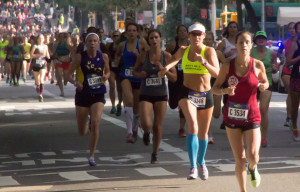 Many of us runners train and race with technology. Be it a GPS watch, an app on a phone, music, many of us are hitting buttons of some kind out there on the run. I am going to encourage you to leave technology at home every once in a while – or to have a running buddy or coach keep an eye on pace.
Many of us runners train and race with technology. Be it a GPS watch, an app on a phone, music, many of us are hitting buttons of some kind out there on the run. I am going to encourage you to leave technology at home every once in a while – or to have a running buddy or coach keep an eye on pace.
Most of us assume we know our potential, and have some idea of what number we should see on a watch for that specific workout. However, I have found time and again that when I am with a runner who doesn’t know their time but is running 100% based on effort, they are capable of pushing the pace faster than they thought. Obviously if someone is blowing their paces out of the water, especially early into a run, I am going to tell them to relax and settle a bit. But towards the end of a run, when I usually want my runners working hardest, it’s amazing what can happen when that athlete is unplugged. Being unplugged, especially from music, means you can really listen to your body and the signals it may give you.
It can take some time to get comfortable running unplugged. Try it, and see what you can gain. I challenge you to try. I’ll admit that I rarely run unplugged. My GPS watch feels like it’s part of me on every run. The handful of times I’ve had to race without my watch (I HATE waiting for the gun to go off with my naked left wrist!), I have almost always set a new personal record. Even on a hot summer morning for a Half Marathon, I set a PR. I promise you that if I’d had my watch, I would have been listening to my watch for pacing in such extreme conditions, than to let it go and go 100% by feel.
So mix up your routine, leave your devices at home or hand the pacing over to a running buddy – and see what you’ve got!




